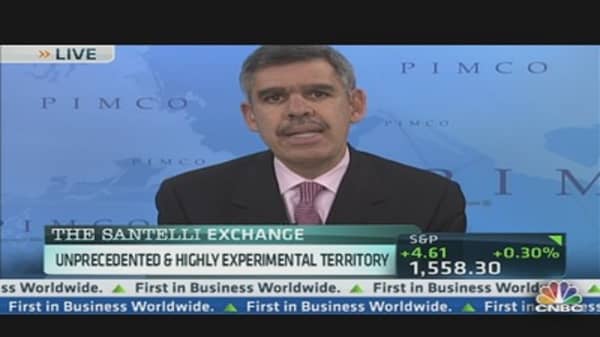(Read More: BOJ Throws In Kitchen Sink in War With Deflation)
"This is the most experimental we've ever seen central banking," he said during an interview on the "Squawk on the Street" program. "They are venturing deeper and deeper, using imperfect tools, and they're not getting the response they expect."
The BoJ measures resemble a similar program by the U.S. Federal Reserve, which has taken its balance sheet past $3 trillion as it has bought government debt in an effort to flood liquidity into the markets and reduce unemployment while stoking inflation.
Both central banks have met uneven success with their efforts. In the U.S., the stock market has zoomed higher, but the economy remains mired to weak growth.
"Rather than step back and ask why (the measures have not succeeded), they just go deeper and deeper," El-Erian said. "The question is, will they finally succeed in transitioning from assisted growth to real growth, or will it end in tears? I think that's a major uncertainty and the market doesn't quite understand just how binary this outcome is."
(Read More: Op-Ed: Blast From the Future on the Crash of 2015)
In the Fed's case, it has set a 6.5 percent unemployment target and 2.5 percent inflation rate before it will consider normalizing interest rates.
Yet the jobless rate remains elevated at 7.7 percent and inflation is below 2 percent, despite a tripling of the Fed balance sheet. El-Erian attributed the jobless issue in particular to structural problems that cannot be solved merely by injecting money into the economy.
(Read More: Why Market's Best Weapon Could Run Out of Gas)
Asked why Fed Chairman Ben Bernanke continues to push the idea that the asset program is working, El-Erian said, "He feels he has no choice."
"He feels he has to buy time for other agencies to address the structural issues," he added. "The question is, how much time is he going to buy, and how much collateral damage is he going to create in the process?"
—By CNBC's Jeff Cox. Follow him on Twitter @JeffCoxCNBCcom.




